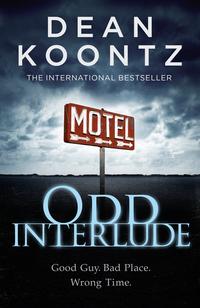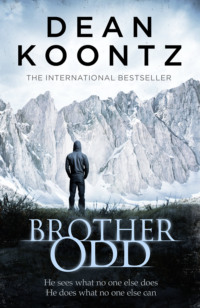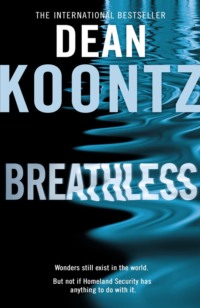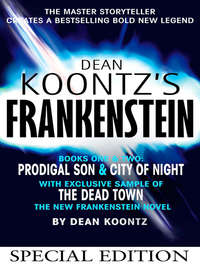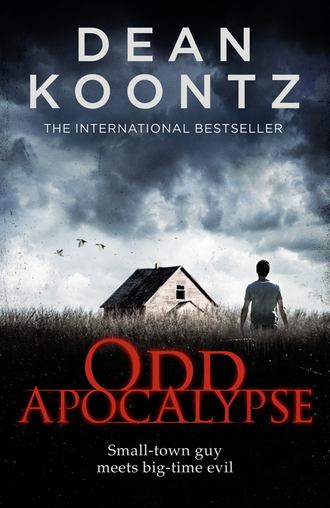
Полная версия
Odd Apocalypse
If the darkness didn’t fully blind the hunter as it blinded me, the fineness of the wire mesh should prevent me from being seen clearly if at all. I was unnerved, however, to think that we might be eye to eye.
Distraction was dangerous. I needed to concentrate on pulling down with all my might on the lids, so that if my adversary abruptly yanked on them, they wouldn’t budge and would seem to be corroded shut.
Another strumming of the screens appeared to be a taunt, as if the hunter knew where I was and wanted to twist my nerves a little, perhaps to salt my flesh with fear sweat and thereby make me tastier.
Now sniffing. Sniffing at the screened holes, like a bloodhound seeking a scent.
I was grateful that the air was so redolent of ozone, for surely that would make me harder to detect.
The sniffing swelled into a vibrant snort, an incredibly noisy fluttering of nares and septum, not the snort of either a man or a dog, but of some predatory creature.
Bleachy ozone tingled in my sinuses, but I trusted providence to prevent a sneeze, refused to worry, declined to dwell on negative possibilities, and I did not sneeze, did not sneeze, still did not sneeze, but then I farted.
Eight
IN THE HOLLOW STEEL-LINED BIN, MY UNFORTUNATE eruption resonated such that it would have humiliated me if my first concern had been social acceptance. My first concern, however, was survival. At the moment, I didn’t have the capacity for embarrassment because terror filled me.
Narcissists are everywhere in this ripe age of self-love, which amazes me because so much in life would seem to foster humility. Each of us is a potential source of foolishness, each of us must endure the consequences of the foolishness of others, and in addition to all of that, Nature frequently works to impress upon us our absurdity and thereby remind us that we are not the masters of the universe that we like to suppose we are.
Even before I revealed myself by that indelicate sound—and just for the record, it was only sound—I knew that I wasn’t a master of the universe. I merely hoped that I might be the master of the feed bin, and in fact its secret master.
That modest ambition was now unfulfilled as the searcher in the dark scrabbled at the lid, tried to tear open one and then the other, and then both at the same time.
With desperate tenacity, I held fast to the pull handles, which were easier to grip than the edge of the lid with which my adversary was struggling.
As it strove to get at me, it not only snorted but also snarled and grunted and growled and even squealed, leading me to conclude that my suspicions were correct, that it wasn’t human, for it didn’t once say “sonofabitch.”
Others of its kind crowded into the dark room. An evil chorus of bestial sounds, their voices were nothing like those of monkeys, but the cacophony was equal to that of a monkey house in a lightning storm.
The first through the door continued to pry furiously at the lids as others began to pound on them and on the sides of the bin. They rocked my haven back and forth, as well, although it was too cumbersome and there was too little room for maneuvering to allow them to tumble it on its side.
I felt like a mouse sealed in a can and subjected to the sport of cruel little boys.
Because my years have been filled with fighting and chasing and being chased, more on foot than in cars, and because I have eaten far less fried food than I have prepared for others, I’m in pretty good physical shape. But already my arms had begun to ache from the strain of holding down the lids.
Remaining a positive thinker was going to get more difficult minute by minute.
One or more of this hungry crowd—if it was in fact a hope of dinner that drove them and not something even more unthinkable—scratched fiercely at the screens in the ventilation holes and then did more than scratch. The fine wire mesh slit with a sound like a pull-tab slider parting the teeth of a tiny zipper, which suggested that they either had knives or exceedingly sharp claws.
They could not seize me by reaching through holes as small as four inches in diameter, but they could poke at me with blades or sticks, which I expected them to do at any moment. If they could see to any extent in darkness, which seemed to be the case, and if the ventilation screens no longer inhibited their view of me, they would know exactly where to jab for maximum effect.
I searched the blackness in front of me for any hint of animal eye shine, but I could detect none. If not for their expressions of anger and need, I might have thought they were robot assassins whose stares were dead black because their eyes were cameras that took in the entire spectrum of light but gave back nothing.
Hands slick with sweat, my grip on one of the pull handles slipped slightly. My primary adversary reacted instantly to that minor fumble, wrenching at the lid with greater fervor.
My heart knocked so hard that its frantic rhythm was a tom-tom pulse in my ears, and even in the chaos of the assault upon the feed bin, I could hear my ragged breathing.
Since I lost Stormy, I have no need of my life. If I should be taken young by some divine act of mercy, perhaps sudden death by accident or a cerebral embolism, I would not care. But like most people who have glimpsed a scene from the latest remake of The Texas Chainsaw Massacre while channel surfing, or have dipped into a Stieg Larsson novel on an unfortunate page, I fear dying in a prolonged and messy fashion that involves either torture or being devoured alive.
Now that I didn’t have to worry about revealing myself with a sneeze, the astringent scent of ozone of course faded a bit, so that suddenly I could smell the horde of zombies or rabid black bears or whatever they were. To call their stench body odor would be like describing the reek of a rotting cabbage as less fragrant than a rose.
I began to gag, and their stink was so intense that I could also taste it. If I started to retch, I might be convulsed with nausea and wouldn’t be able to pull hard enough on the lids to keep the beasts out. The very thought of retching caused me to retch. A bitter mass rose in my throat, I choked it down, but I knew that I wouldn’t be able to swallow it again.
Suddenly the pack in the feed room fell silent and halted their assault. Their smell swiftly ebbed, receded entirely, as did the tang of ozone.
Beyond the torn screens in the ventilation holes, the light of the stable sconces—if not also daylight—seemed to plume into the dark room through the open doorway, as if it were not real light at all but instead a phosphorescent exhalation of cold breath, which then lay as a pale and uneven gray condensation on the rough board walls.
I was accustomed to being the target of violence. But I wasn’t familiar with bad guys who, at the height of their assault and having victory within their grasp, abruptly turned peaceable and went away to meditate.
Whatever they were, the motivation for their retreat was not likely to be an attack of conscience and a tender desire to dispense a little mercy.
Some people misunderstand evil and believe it will relent, and because their misplaced hope inspires dark hearts to dream darker dreams, they are the fathers and mothers of all wars. Evil does not relent; it must be defeated. And even when defeated, uprooted, and purified by fire, evil leaves behind a seed that will one day germinate and, in blooming, again be misunderstood.
I had defeated nothing. I knew better than to believe that my mysterious attackers would not return. The question was—when?
Holding fast to the pulls on the underside of the feed-bin lids, I listened but heard nothing except my less frantic breathing and an occasional twang as my weight shifting ever so slightly upon the stainless-steel liner caused it to flex.
After a minute or so, the pale light, the absence of ozone, and the silence drew me to the conclusion that the grunting pack had not left of their own will but had been somehow swept away when the too-early nightfall was magically undone and the day restored to morning.
I didn’t know how night could have come so quickly after dawn or how it could have been rolled back, as if time were not a river with a fixed course but instead a changeable wind gusting now toward but now away.
My curious life has been filled with supernatural events, but never before one like this.
An argument could be made that the many strange things I see and experience are in fact as natural as the sun and moon, and that the five senses of other human beings have not yet adapted to the full reality of the world.
That theory would seem to suggest that I am special, better than others, but I know that isn’t true. In spite of my talent, I am not any better than any other soul seeking redemption, no more than a good musician is a better person than those with no musical talent, and I am worse than some.
Willing to entertain the possibility that I would not be torn asunder and eaten if I ventured forth, I let go of one of the lids, pushed up the other, and clambered out of the feed bin.
I believed that I now knew what a lobster felt as it languished in a tank beside the maître d’ station in a restaurant, while hungry patrons, waiting to be seated, tapped the glass and remarked upon its size and succulence.
Stepping out of the feed room, I saw that the south door was closed and the north one stood open precisely as far as it had when I first entered the stable. The sconces, which had failed earlier, now glowed. At the windows, the day was as it should be: plenty of light, brighter to the east than to the west.
Warily, I proceeded through the stable to the open door, but no threat manifested.
When I switched off the lights and stepped outside, the morning was fair and mild and right. The bright brush of a single sun painted the trees and grass and sloping land, leaving the distant ocean still half dark like gray slate through which were smeared some of the softer colors of the clay from which it had been formed. The stable cast a single black shadow, to the west, as did I. The rock and the crumpled Coke can had reappeared; they, like all things around me, spilled their silhouettes only westward in ordinary daylight.
For a moment some power had imposed chaos on the day, followed by this reprieve. This is the world of men and women in their flesh, and more often than not they rebel against order, preferring the perceived freedom of a measured chaos. But chaos half-loosed cannot be long controlled; it is all or nothing. This reprieve would be brief.
Whatever might be happening at Roseland, it was misconceived by men in the quest for power, because it was a lust for power of one kind or another that quivered at the root of every base human desire. I sensed that not only the land sloped from east to west; within the grounds of this walled estate, reality also was tilted from the norm and was being steadily levered to an ever more severe angle, until Roseland would abruptly slide to ruin, reason would slither down to madness, and everyone here would cascade into death.
The sun was hardly risen, but already time was running out.
Nine
IF THE ONSET OF NIGHT SO SOON AFTER DAWN AND then its equally astonishing repeal had been observed by others in Roseland, they were remarkably unmoved by it. As I crossed the estate, I expected to see at least a couple of people on terraces or lawns, regarding the sky with wonder if not terror, but no one was out and about. Although I couldn’t understand how such a stunning cosmological event could be confined to the stable, apparently only I had experienced it.
I see the lingering dead, but I don’t have hallucinations. And I didn’t believe that Chef Shilshom spiked my almond croissant with peyote. If the guard at the front gate, where I was headed, did not remark on an eclipse of the sun, then the change from day to night, to day again, had been weirdly localized.
Nine feet high and three thick, the wall surrounding Roseland’s fifty-two acres had been built of concrete faced with stones gathered from the property. In the only gap, the impressive gates at the driveway entrance were not formed from pickets and rails through which the curious might peer, but were solid panels of bronze decorated with copper discs like those in the floor of the stable.
The gatehouse was of the same stone. Like the guesthouse tower in the eucalyptus grove, its windows were narrow and barred, and its ironbound-oak door stood like a challenge to barbarians.
About fourteen feet on a side, the building was large for its purpose, containing an office, a kitchenette, and a bathroom. I’d had only a glimpse inside, through the open door, on our second day here. But I could not have failed to notice the gun rack on the farther wall: two shotguns—one with a pistol grip—and two assault rifles.
Apparently, they intended to leave no doubt in the minds of door-to-door salesmen that when they said no, they were serious.
On the north side of the structure, adjacent to the driveway, an extension of the sloped roof, supported by four posts, provided a six-foot-deep shelter where a guard might stand in bad weather to speak with arriving guests. In that shade, to the right of the door, Henry Lolam sat in a captain’s chair with a padded seat.
He was perhaps thirty, and handsome in such a boyish way that on first encounter he seemed callow. Unlined face, mouth as innocent as that of a child who had not yet spoken one curse, cheeks the pink that sometimes blushes peach skins, he looked as if nothing hard in the world had touched him, as if he’d drifted through it like dandelion fluff on the softest warmest breeze that ever blew.
His green eyes were alien in that boyish face, full of loss and anguish and, at times, bewilderment.
As on the two other occasions when I had sought him out, Henry was reading a book of poetry. On a small table beside his chair were other haphazardly stacked volumes by such poets as Emerson, Whitman, and Wallace Stevens, a dangerous crew to let into your head.
Some will be skeptical of the contention that a security guard—a “rent-a-cop,” in the mocking Hollywood argot of our times—might be immersed in poetry. The uniqueness of every soul is not a theme that our current culture, obsessed with group identities, cares to assert. But Henry was himself and no one else, and judging by the intensity with which he focused on those verses, he sought from them something profound.
While he lingered over the last stanza of a poem, I leaned against a porch post and waited. He was not rude, merely preoccupied.
I had come here to ask him about Kenny Randolph Fitzgerald Mountbatten, who claimed to be a Roseland security guard even though he hadn’t worn the uniform—gray slacks, white shirt, blue blazer—that the other guards wore and though he was in so many ways more flamboyant than Henry and his colleagues.
Waiting, I watched what appeared to be a peregrine, judging by its immense wingspan and the universal pattern of its underwings. These falcons generally hunted smaller birds, rather than rodents, making spectacular swoops and seizing their prey in midair.
When Henry closed the book and looked up, a lost expression marked his eyes, as if he knew neither me nor where he was.
I said, “I’m sorry to interrupt, sir.”
His confusion, or whatever it might be, ebbed, and in ebbing washed a smile onto his beach-smooth face. He appeared as boyish as any preadolescent in a Norman Rockwell painting—as long as you did not care to see more in his eyes than the green of them.
“No, no,” Henry said. “I enjoy our chats. Sit down, sit down.”
To the left of the door, he had earlier put out a second chair, apparently in anticipation of my visit. I settled in it, deciding there was no point in asking about an eclipse.
“I’ve been brushing up on my UFO history,” Henry said.
He was intrigued by reports of abductions by extraterrestrials and alien bases on the far side of the moon. Although I could not say why I felt so, I suspected that he sought the same thing in UFO lore that he pursued in poetry.
Aware of the irony of a spirit-seer debunking the possibility of visitors from outer space, I nevertheless said, “I’m sorry, sir, but I just can’t buy into flying saucers and all that.”
“Several of those who’ve been abducted have passed lie-detector tests. There’s a lot of documentation.”
“See, it doesn’t make sense to me that a superintelligent race would come all the way across the galaxy just to abduct people and put probes up their rectums.”
“Well, that’s not the only thing they do in their examinations.”
“But it always seems to be the first and most important thing.”
“Don’t you think a colonoscopy is advisable now and then?”
“I can get one from a doctor.”
“Not as thorough as the one the aliens give you.”
“But, sir, why would aliens be interested in whether I have colon cancer?”
“Maybe because they care,” Henry said.
I had learned that to get to a subject that I wished to discuss, I had to indulge Henry’s bizarre fascination with proctologists from other worlds. Indulging him, however, didn’t mean taking a craziness pill and tripping with him, and I remained a skeptic.
“I suspect they’re just very caring,” Henry persisted.
“Coming fifty light-years to give me a colonoscopy is so caring it’s downright creepy.”
“No, Odd, you see, fifty light-years to them might be like fifty miles to us.”
“Coming even fifty miles to force a probe up my butt without my permission is a pretty good definition of a pervert.”
Henry’s face was alight with wonder at the idea of aliens, and dimpled with the amusement that any mischievous boy feels when he gets a seemingly legitimate chance to talk about butts and such.
“They’re probably taking DNA samples, too.”
I shrugged. “So I’ll give them a lock of my hair.”
Smiling dreamily, but turning the book of poetry over and over in his hands as if agitated, he said, “Some UFO experts think the aliens have conquered death and just want to give us immortality.”
“Give it to everyone?”
“They’re so compassionate.”
“Lady Gaga’s cool,” I said. “But a thousand years from now, I don’t want to have to listen to Lady Gaga’s seven hundredth album.”
“It wouldn’t be boring like that. Immortal, you could change careers again and again. Be a singer like Lady Gaga, and she can be a fry cook.”
I grimaced. “I can’t sing, and I have a hunch she can’t cook.”
He thumbed repeatedly, insistently through the pages of the book without looking at it, making a sound like shuffled cards. “Enhanced by alien technology, we’ll all be able to do everything perfectly.”
“Then why do anything at all?”
“What do you mean?”
“If there’s nothing to learn because we know it all, what’s the challenge, why would the effort matter, what would be the point?”
For a moment he continued riffling the pages of poetry, but then his hands grew still and the smile flatlined.
I waited for his reply, but he didn’t make one. After a while, he said, “I’m supposed to be on vacation. Eight weeks in Hawaii.”
Noah Wolflaw didn’t seem like a guy who would play Santa Claus to his employees, but I didn’t remark on the generosity of a two-month vacation.
Henry gazed now at the falcon as it circled lazily, patient in its quest for prey. Subtle but unmistakable, his look of desolation was so unsuited to his boyish face, I suspected that he was in some emotional distress and that, into my silence, he might say something revealing and useful to me.
“I spent two weeks in Hawaii and just couldn’t stand it anymore. Flew to San Francisco for a week, and that was no better.”
The peregrine glided silently, and I as well felt falconish, in my mind circling above the guard, waiting patiently for him to speak words that might be meat to me.
“It wasn’t those particular places,” Henry continued. “Wherever you go these days, it’s all wrong, isn’t it? I don’t know why, but it is.”
I didn’t believe that he wanted any comment from me. He seemed to be thinking out loud.
“People are so different from how they used to be. So fast. There’s an endless opening of possibilities.”
Fearing that he might wax as cryptic as Annamaria, I sought a little clarification: “You mean the Internet, technology, and all that?”
“Technology changes nothing. People were people before and after the steam engine, before and after the airplane. But … not quite now. Walls. That’s what it is. The problem is walls.”
I waited, but he said nothing more, and at last, with some exasperation of which I’m not proud, I said, “Walls. Yes. How true. We have to have walls, don’t we? Or maybe we don’t? You start with walls, and then you need a ceiling. And floors. And doors. It just never stops. Tents. That might be the answer.”
If he heard my words, he didn’t detect my sarcasm. “Five weeks of vacation left, but I just couldn’t stand being out there anymore. I hate the wall around Roseland, but the gate in it is a gate to nowhere.”
When after a while he didn’t continue, I prodded him by saying, “Well, as I see it, that gate is a gate to everywhere. The whole world’s beyond it.”
I figured he was ruminating on my sage comment, but he wasn’t. He flew off on what seemed to be another line of thought.
“‘Things fall apart; the center cannot hold.’”
Although I recognized those words, I didn’t at once know from what source he was quoting.
Before I could ask, Henry recited the famous lines of poetry about the falcon and the falconer, a metaphor for man and God, the former flying ever farther from the latter, the pagan cruelty of the human heart breaking loose from civilizing tradition.
“Yeats,” I said, naming the poet, and might have been pleased with myself if I had understood what the hell he was talking about.
“I hate it here, this Roseland without roses, but at least there’s a wall, and with a wall the center might still hold.”
He wasn’t hysterical, just enigmatic, but I really wanted to slap him until he made sense, the way the hero sometimes slaps the raving hysteric in the movies. But no matter how frustrated I may be, I never slap a man who is carrying a pistol in a shoulder holster under a blazer tailored to allow a quick draw.
Henry shifted his attention from the falcon to me. In his Huck Finn face, his eyes were as bleak as those of Hamlet.
His vulnerability could not have been more obvious. I sensed that the ease with which he opened himself to me was an indication that he was friendless, sought friendship, and could be cultivated to such an extent as to reveal secrets of Roseland that would help me understand why I was here and what I must do.
True friendship, however, is a sacred relationship even if it doesn’t involve formal vows. The friends I’ve made in Pico Mundo and everywhere I’ve gone since leaving home have kept me from despair, have nurtured hope. When I considered how I might cultivate Henry, I meant manipulate. There’s nothing wrong with manipulating bad men in pursuit of truth, but I didn’t think Henry Lolam was bad or deserved the contempt that manipulation represented. To pretend friendship here would be to devalue all the real friendships in my life.
While I hesitated, the moment of opportunity passed, and Henry said, “Guests in Roseland are rare.”
“The lady I’m traveling with seems to have … charmed Mr. Wolflaw.”
“She’s not his type. She’s not low or flashy, or cheap.”
By insulting his employer, Henry raised my hopes that he might treat me as a confidant without requiring that I fake friendship.
Silence seemed to serve me best, and after a moment, Henry said, “You’re not her lover.”



